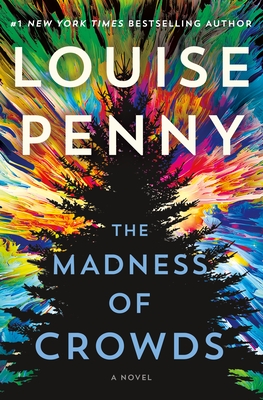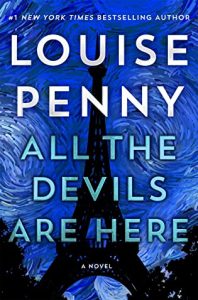 The Madness of Crowds (Chief Inspector Armand Gamache, #17) by Louise Penny
The Madness of Crowds (Chief Inspector Armand Gamache, #17) by Louise Penny Format: ebook
Source: purchased from Amazon
Formats available: hardcover, paperback, ebook, audiobook
Genres: mystery, suspense, thriller
Series: Chief Inspector Armand Gamache #17
Pages: 448
Published by Minotaur Books on August 24, 2021
Purchasing Info: Author's Website, Publisher's Website, Amazon, Barnes & Noble, Kobo, Bookshop.org
Goodreads
Chief Inspector Armand Gamache returns to Three Pines in #1 New York Times bestseller Louise Penny's latest spellbinding novel
You're a coward.
Time and again, as the New Year approaches, that charge is leveled against Armand Gamache.
It starts innocently enough.
While the residents of the Québec village of Three Pines take advantage of the deep snow to ski and toboggan, to drink hot chocolate in the bistro and share meals together, the Chief Inspector finds his holiday with his family interrupted by a simple request.
He's asked to provide security for what promises to be a non-event. A visiting Professor of Statistics will be giving a lecture at the nearby university.
While he is perplexed as to why the head of homicide for the Sûreté du Québec would be assigned this task, it sounds easy enough. That is until Gamache starts looking into Professor Abigail Robinson and discovers an agenda so repulsive he begs the university to cancel the lecture.
They refuse, citing academic freedom, and accuse Gamache of censorship and intellectual cowardice. Before long, Professor Robinson's views start seeping into conversations. Spreading and infecting. So that truth and fact, reality and delusion are so confused it's near impossible to tell them apart.
Discussions become debates, debates become arguments, which turn into fights. As sides are declared, a madness takes hold.
Abigail Robinson promises that, if they follow her, ça va bien aller. All will be well. But not, Gamache and his team know, for everyone.
When a murder is committed it falls to Armand Gamache, his second-in-command Jean-Guy Beauvoir, and their team to investigate the crime as well as this extraordinary popular delusion.
And the madness of crowds.
My Review:
 There are four sentences that Chief Inspector Armand Gamache tells to every Sûreté du Québec officer who becomes a part of his team. He often ticks them off on his fingers as he recites them, and even though the order changes, the totality never varies.
There are four sentences that Chief Inspector Armand Gamache tells to every Sûreté du Québec officer who becomes a part of his team. He often ticks them off on his fingers as he recites them, and even though the order changes, the totality never varies.
“I’m sorry. I was wrong, I don’t know. I need help.”
Those four brief sentences may not be the path to wisdom, but they seem to be the path to being a good officer when taken to heart. And, as we all know in real life, any of them can be difficult to say, especially in the moments when they are most needed.
And they form an important backdrop to this seventeenth entry in the series, as Gamache finds himself saying the first three parts pretty much over and over again in this case that reaches back so far and has so many twists and turns that he is often forced to backtrack from his current course in his latest attempt to figure out exactly who did what in the past that lead to the dead woman in the snow in the present.
Not that there aren’t plenty of motives in the present as well, but those reasons don’t seem to apply to this particular corpse. A question that haunts and confuses Gamache’s entire investigation from its very beginning.
Deborah Schneider is in Three Pines with her childhood best friend Abigail Robinson. And there are PLENTY of reasons for people to want Robinson dead. Reasons that are rooted in the pandemic that has just passed. And it has passed in Three Pines, and seemingly even in the Province of Québec and Canada as a whole by the time this story takes place.
It seems that the Canadians, certainly the fictional ones, have been more reasonable about getting vaccinated and were more reasonable about wearing masks as well.
What people are not being at all reasonable about are the discoveries in the aftermath of the pandemic. Just as the aftermath of Hurricane Katrina uncovered more than one long term care institution whose patients had been abandoned to the flood, the receding tide of the pandemic in Canada has uncovered many too many care homes, particularly for the elderly, where the patients were left to die by the people who were supposed to be caring for them.
 And Abigail Robinson, with her Ph.D. in statistics and her sterling reputation, has produced a technically correct but morally repugnant study that claims that Canada, in its entirety, will be unable to fully recover from the pandemic or any future such calamities if it doesn’t triage out of its population those who have the least chance of recovery and the greatest chance of becoming a long-term burden on the system and the rest of the population.
And Abigail Robinson, with her Ph.D. in statistics and her sterling reputation, has produced a technically correct but morally repugnant study that claims that Canada, in its entirety, will be unable to fully recover from the pandemic or any future such calamities if it doesn’t triage out of its population those who have the least chance of recovery and the greatest chance of becoming a long-term burden on the system and the rest of the population.
There are plenty of tired and scared people willing to follow her recommendations, a course of action that would transform the right to die into an obligation to die at a point predetermined by the government.
The recommendations are so morally repugnant that the Canadian government agency that funded the study has refused to endorse it or publish it. But in these days of instant internet communication, the report is everywhere and support for it is gaining ground.
If someone had killed Abigail Robinson, who has become an all-too-excellent and savvy representative of her terrible theory, no one would be terribly surprised. But Robinson is not dead. Instead, the woman who was her right-hand was bludgeoned to death with a fireplace log.
Was it just a case of mistaken identity? Or does the crime, and the reason for it, stretch back into the past – right along with the true origins of Robinson’s heinous proposal?
Escape Rating A-: On the one hand, I was very glad for this story to return to the series’ heart and home in Three Pines. And on the other, the pandemic hangs over everything like a bad smell, making this dark story even darker. Not that the story is bad, in fact it’s very, very good, but there’s a darkness in the past that needs to be uncovered, actually more than one such darkness, and a darkness in the present and the entire situation gets more than a bit murky.
So much of what makes this series work are its characters, not just Gamache himself but his close colleagues at the Sûreté du Québec and his friends and neighbors in the village of Three Pines. But it felt like there was maybe one too many new people, or people who weren’t fully integrated into the story, and it diffused the story a bit.
And the heart of the story was so damn personal. It’s clear from pretty much everyone’s reading of Robinson’s report that while it’s initial implementation is intended to force the elderly, particularly those with long-term health issues, to feel obligated to die – or that there will be literal death panels. But the implication is that the concept will be expanded to include anyone with permanent disabilities of any kind no matter what their age. People like Gamache’s infant granddaughter Isola who was born with Down syndrome.
Anyone who has a loved one with long term care issues has plenty of reasons to want to kill Robinson. But she’s not the one who is dead.
The case that Gamache must solve drags him out of his comfort zone, and into another governmentally sanctioned road to hell that links Robinson, the poet Ruth Zardo, and Three Pines’ resident “Asshole Saint”.
 I started this one afternoon and finished it later that evening, because I couldn’t put the damn thing down. But it is a walk through dark places, and there are points where it seems like the twisty passages are all like. The origins of everything are so far back and the character holding a big chunk of the information Gamache needs is pretty much a lying liar every step of the way and I wanted a confrontation that needed to happen multiple times but never quite does. It also felt like there was one completely extraneous character, although who I felt that was shifted a bit. Rather like one of those large ensemble cast TV series that needs to lose one or two people to tighten up right and really zing.
I started this one afternoon and finished it later that evening, because I couldn’t put the damn thing down. But it is a walk through dark places, and there are points where it seems like the twisty passages are all like. The origins of everything are so far back and the character holding a big chunk of the information Gamache needs is pretty much a lying liar every step of the way and I wanted a confrontation that needed to happen multiple times but never quite does. It also felt like there was one completely extraneous character, although who I felt that was shifted a bit. Rather like one of those large ensemble cast TV series that needs to lose one or two people to tighten up right and really zing.
But it still gave me an epic book hangover because I love these characters, felt for them, and wanted to spend more time with them. And I will, hopefully sometime next year with the OMG 18th book in the series!





















I was waiting for this review and it came a day early!
I couldn’t resist the book. I was kind of hanging on my kindle waiting for it to show up after midnight Monday night. Hope the review helps!
Marlene Harris recently posted..Stacking the Shelves (459)
I am stumped as to how Abigail could have killed Deborah with a fireplace loge without there being a lot of commotion. Sounds like three quicks head hits and done. More like a man killing. How could Abigail have snuck up on her to make the first blow. Or were they arguing in which case should have been a more disturbed snow fight scene? And at about the page of the denouement, Gamache says he missed something but then seemed to come right back to Abigail as the killer. Did I miss something. IS this going to be another false murderer accusation like I believe it was Gabriel in a prior book. Gamache even admits its a hard case to prosecute without confession. Did I miss something? Help. Love her work. Thank youi